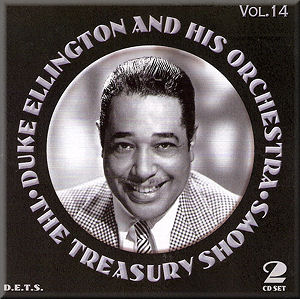CD 1
1. (Theme) Take the "A" Train
2. Time's A-Wastin’
3. Every Hour on the Hour
4. Bond Promo
5. Hollywood Hangover
6. (Theme) Take the "A" Train
7. Autumn Serenade
8. Hop Skip And Jump
9. Riding on a Blue Note
10. I'll Buy That Dream
11. Bond Promo
12. Riff'n' Drill
13. Tell Ya What I'm Gonna Do
14. How Deep is the Ocean?
15. Mood Indigo
16. (Theme) Take the "A" Train
17. Three Tunes In The Blue Mood: Diminuendo In Blue, I Got It Bad,
Crescendo In Blue
18. Everything But You
19. Bond Promo
20. Everything But You
21. Between The Devil and the Deep Blue Sea
22. After All
23. Out of this World
24. C-Jam Blues
25. (Theme) Take the "A" Train
CD 2
1. (Theme) Take the "A" Train
2. Ultra Blue
3. Teardrops in the Rain
4. Time on my Hands
5. Riff Staccato
6. (Theme) Take the "A" Train
7. Ko-Ko
8. If I Loved You
9. Bond Promo
10. Subtle Slough
11. Honeysuckle Rose
12. Perdido
13. Air Conditioned Jungle
14. (Theme) Take the "A" Train
15. (Theme) Take the "A" Train
16. Waiting for the Train to Come In
17. I'd Do It All Over Again
18. Bond Promo
19. Fancy Dan
20. Homesick, That's All
21. Blues on the Double
22. Every Hour on the Hour
23. Bond Promo
24. Caravan
25. Riff'n' Drill
26. Things Ain't What They Used To Be
CD1
Duke Ellington - Piano, arranger, leader
Billy Strayhorn - Piano, arranger
Taft Jordan, Shelton Hemphill, Cat Anderson - Trumpets
Rex Stewart - Cornet
Joseph Nanton, Lawrence Brown , Claude Jones - Trombones
Johnny Hodges, Otto Hardwick - Alto saxes
Al Sears - Tenor sax
Jimmy Hamilton - Clarinet, tenor sax
Harry Carney - Baritone sax, clarinet, bass clarinet
Fred Guy - Guitar
Junior Raglin - Bass
Sid Catlett - Drums
Joya Sherrill, Al Hibbler, Kay Davis - Vocals
CD2
Add Russell Procope - Alto sax
Sonny Greer replaces Sid Catlett - Drums
The Treasury Shows were a series of radio broadcasts during 1945
and 1946 made by the Duke Ellington Orchestra and sponsored by the
US Treasury to try to persuade listeners to buy "Victory Bonds".
The continual appeals for this cause - many of them from Ellington
himself - remind us of how much the war impoverished the USA, as the
pleas often seem to take on an air of desperation. All this aside,
these broadcasts are a treasure trove of music by Duke's band which
has been steadily rescued and remastered by Jerry Valburn and his
colleagues for our enjoyment.
And what enjoyment there is to be derived from the recordings! These
two CDs each contain programmes running for more than 70 minutes which,
despite the repetition of Duke's theme-tune, Take the "A"
Train, and the recurring appeals for money, include many gems
which might otherwise have blushed unseen.
One advantage of these broadcasts is that the band could stretch
out for longer than the three minutes which was the normal length
of a 78rpm disc. For example, in the second track of the first CD
- Time's A-Wastin' - Johnny Hodges's solo sounds as if it might
end the track, but Hodges continues for an extra chorus, diminuendo.
Then he opens the following track with a rapturous introduction to
Al Hibbler's vocal.
This illustrates another strength of these recordings: the way that
they allow us to hear Duke's star soloists in some of their finest
work. In Air Conditioned Jungle, Jimmy Hamilton's clarinet
sounds tougher than usual, and he is featured on several other tracks.
Rex Stewart's unique cornet barks out in Riding on a Blue Note,
and Harry Carney's inimitable baritone sax lights up I'll Buy That
Dream as well as underpinning such tunes as Ko-Ko. Ellington
makes special mention of Russell Procope's return to the band for
the second CD, where he is featured in Honeysuckle Rose and
Perdido. The one soloist who gets on my nerves is trumpeter
Cat Anderson with his imprecise attempts to pierce the sound barrier.
Some tracks - especially the vocals - stray slightly away from jazz
into the category of popular song. Kay Davis is accompanied by Billy
Strayhorn at the piano in a very straight version of If I Loved
You. But most of the popular songs are lifted out of the ordinary
by the imagination in Ellington's voicings.
In later years, the Duke sometimes incurred criticism for including
medleys of his "hits" in his concerts. However, one thing
that strikes me about this album is the richness of Duke's repertoire,
encompassing many compositions by Ellington and Strayhorn, as well
as standards like How Deep is the Ocean and Time on my Hands.
Tunes such as Riff 'n' Drill and Fancy Dan only appeared
in the band's programme in 1945, and the former disappeared from the
repertoire after 1947.
Above all, this double album - like many other Ellington recordings
- is particularly notable for Duke's arrangements and his use of individual
voices in the band to create a unique sound and style. Let us hope
that Storyville continues to release these broadcasts on CD. It aims
to issue 24 double albums in all, adding to the already matchless
legacy that Duke Ellington left us.
Tony Augarde
